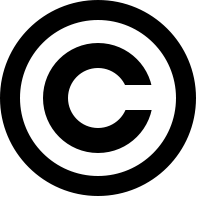 A couple days ago I heard an interview with James Boyle on NPR that reminded me of a lot of information related issues that I have previously discussed with other librarians (and my father). See Boyle bring up the issue that current copyright laws are actually a disservice to the general public. While no one wants the author of any piece, be it in writing, audio or visual format to be robbed of their intellectual products, we also need to think of the needs of the general public.
A couple days ago I heard an interview with James Boyle on NPR that reminded me of a lot of information related issues that I have previously discussed with other librarians (and my father). See Boyle bring up the issue that current copyright laws are actually a disservice to the general public. While no one wants the author of any piece, be it in writing, audio or visual format to be robbed of their intellectual products, we also need to think of the needs of the general public.
Copyright is supposed to give the intellectual author of a piece credit and when appropriate, income from their work. All this is great, the problems begin when people begin extending these rights for increasingly long periods of time, and passing these rights down through the generations. In effect this creates a scenario where an increasingly larger amount of information is under copyright, but out of print, and therefore out of reach to most users.
For a little historical background, the Copyright Term Extension Act (CTEA) dates back to 1998, when copyright in the USA was extended by an additional 20 years. Before copyright would last the lifetime of the author, plus an additional 50 years, 75 years in the case of a corporate authorship. Fair enough, but now the extended term says the copyright holder has copyright for a lifetime plus 70 years, and 120 years for corporate authorship. These extended dates are making more and more information inaccessible to users.
I’ve discussed these issues with my father because he works as a scientist in a third world country and he is often frustrated by finding so much intellectual material inaccessible. The organization where he works has little money to buy access to the large (and expensive) journal databases, the fact that he lives outside the USA means that mailing documents back and forth is difficult, costly and timely. So how is he supposed to get current information to keep up to date in his field? He’s been forced to increasingly rely on Google Scholar, which he thinks is a great source to find useful citations, but often doesn’t provide full text article. And we’re back to large amounts of information being out of the reach of users.
All this brings me back to the issues of copyright, and in Boyle’s case to the Public Domain. As a people it is in our collective best interest to be educated. There are plenty of books, pieces of music, movies and the like that have become part of our collective understanding of the world, and we should all be able to use these works. And I’m not advocating that authors get the short end of the stick and not be able to claim copyright. Everyone who produces intellectual material of some kind or other should be given full credit for their work, and should be allowed to profit from it when appropriate, but I don’t see why this person’s offspring or trust holder should continue to make money off their work when they are not the authors. Likewise it bothers me that this situation prevents people like my father from being able to access material in an inexpensive and timely manner.
Fortunately a few things are changing. For one people are starting to publish in the public domain, making their work available under licenses such as Creative Commons. (Even president elect Obama has begun using them!) Universities such as Harvard are encouraging their faculty to embrace open access and sites such as the Directory of Open Access Journals (DOAJ) are helping us find more and more information that is freely available to us.
Coming back to that NPR interviews, you should check out James Boyle’s book The Public Domain: Enclosing the Commons of the Mind. He will give you much more detail on the subject, and true to his word, you can either purchase the book, of download the entire thing for free from his website!